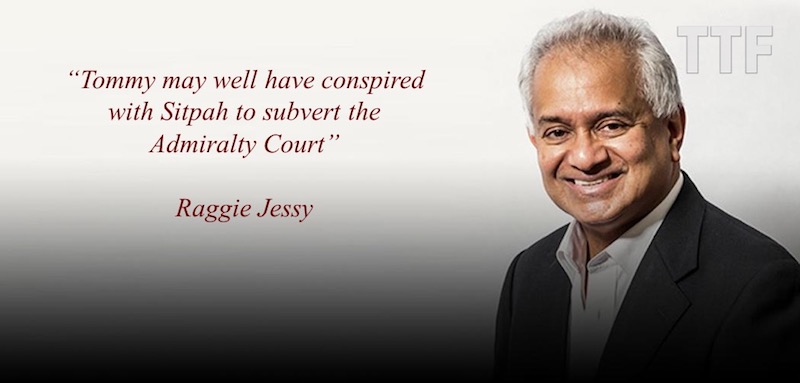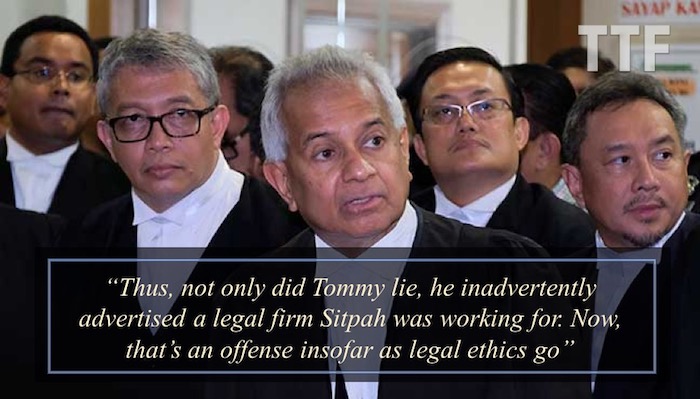Tommy Thomas, Mahathir and Equanimity – the con job of the century

On the 9th of August 2018, Malaysian Attorney-General Tommy Thomas revealed that a Ms Sitpah Selvaratnam had been appointed to advise him and his Chambers on matters of jurisdiction related to the seizure of Equanimity.
According to him, Sitpah was a consultant in a firm that no longer belonged to him.
However, a check by my team revealed that she was attached to a law firm named after him at the time he announced her appointment and is still attached to the said firm, based in Kuala Lumpur.
By appointing a legal counsel who once was (and could still be) under his payroll, Tommy undermined the power and authority bestowed upon an International Affairs Division that sits in his Chambers and threatened to misrepresent the Government of Malaysia as principal legal advisor.

THE THIRD FORCE
On the 9th of August 2018, Malaysian Attorney-General Tommy Thomas revealed that a Ms Sitpah Selvaratnam had been appointed to advise him and his Chambers on matters of jurisdiction related to the seizure of the luxury liner Equanimity. According to him, Sitpah was the most qualified for the job, as not only had she been the chairperson of the Shipping and Admiralty Law Committee of the Bar Council for years and the founding president of the International Malaysian Society of Maritime Law, his Chambers lacked a Specialist Shipping unit with the skill and expertise in shipping and corporate law.
Was Tommy Thomas telling the truth?
No!
A check by my team revealed that the Attorney General’s Chambers (AGC) does have an International Affairs Division (IAD) that previously was part of an Advisory and International Division, or AID. Following a restructuring exercise in 2003, the AID was divided into two separate divisions – the Advisory Division (AD) and the IAD. The split was done to manage increasing workloads and the complexity of municipal and international subject matters. The split was also to develop and enhance the skills and expertise of legal officers in both fields.
Notwithstanding, the IAD has years and years of experience in shipping and corporate law and has dealt with seizures and transfer of authority hundreds of times. What this means, is that Tommy could have relied on expertise from the IAD and need not have appointed Sitpah to advise him.

What exactly is the International Affairs Division for?
The stated objectives of the IAD are as follows:
2. To give legal advice and views to the Government of Malaysia (GoM) in accordance with international law and principles taking into account domestic laws, national policies and public interest, and
3. To ensure that Malaysia’s international obligations under any agreements, treaties and conventions which have been signed, agreed upon, ratified, acceded to or participated in by the GoM are carried out in accordance with constitutional provisions and its domestic laws, regulations and policies.
What are its core functions?
The division’s core functions are as follows:
1. Providing legal advice to the GoM and its agencies on all aspects relating to international law and Malaysia’s existing international obligations.
2. Representing the AGC and the GoM in the international for a with a view to protect the interest of Malaysia internationally.
3. Carrying out harmonisation of Malaysia’s domestic laws based on Malaysia’s existing obligations under international law.
4. Providing legal advice to government ministries and agencies on implementation of various international instruments to which Malaysia has become party
5. Assisting in drafting of relevant laws of various legal instruments relevant to Malaysia’s obligations under international treaties.
6. Undertaking relevant research as to matters pertaining to international law.
How extensive is the unit?
When first formed, the IAD had only 27 officers and 22 supporting staff. That increased over time, with the division’s current directory listing more than 60 officers spread over several smaller units, namely, the Border, Territorial and Maritime Matters Unit (BTMMU), the International Criminal Matters Unit (ICMU), the Human Rights and International Organisations Unit (HRIOU), the Bilateral and ASEAN Trade and International Finance Unit (BATIFU), the Multilateral Trade, International Arbitration and Disputes Unit (IADU) and the Environment, Space, Civil Aviation and Private International Law Unit (ESCAPILU).

